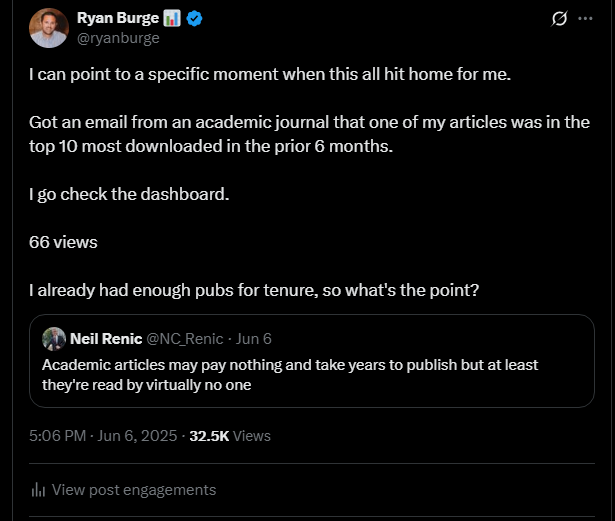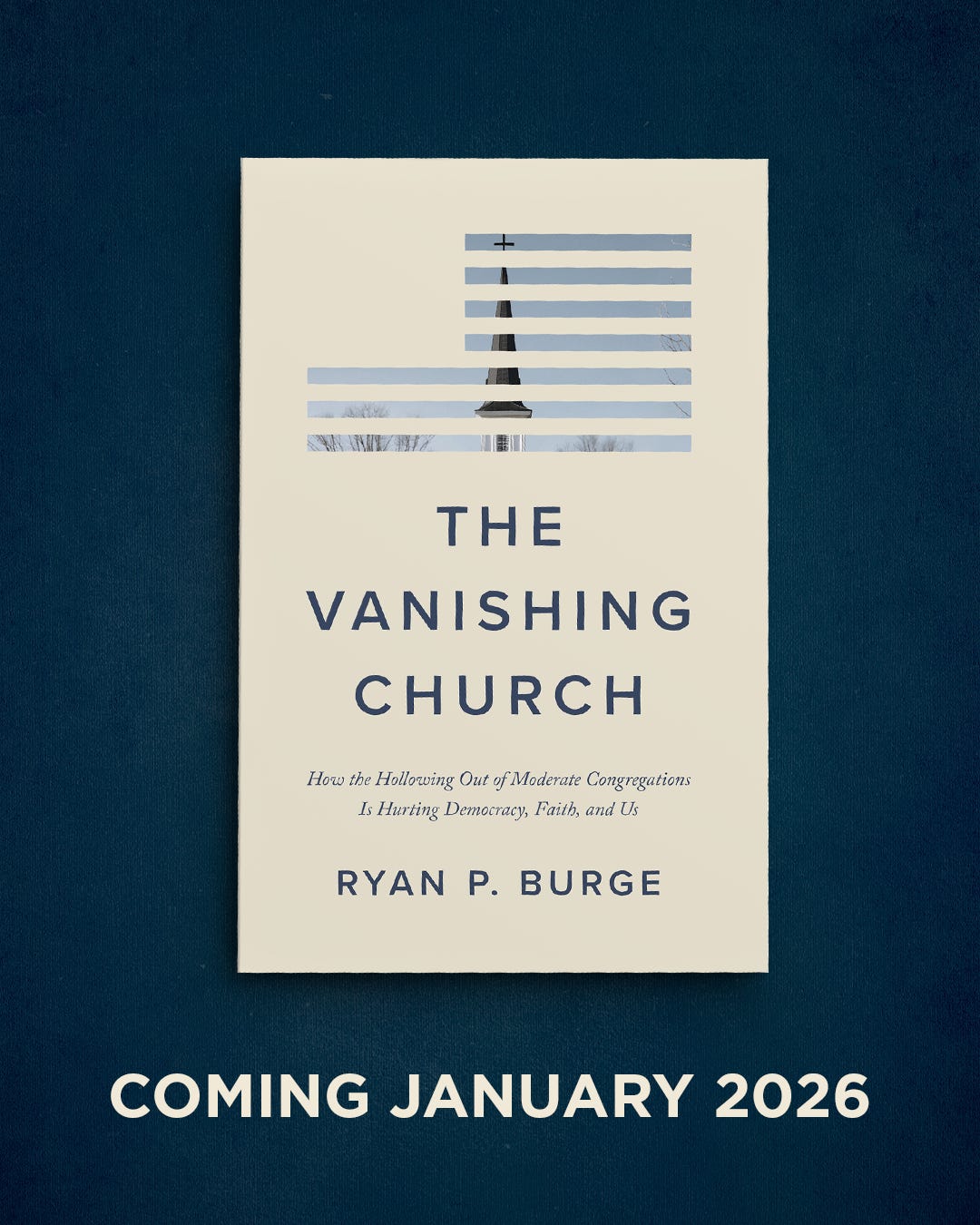Three Big Announcements
A Job - A Book - A Project
I try hard not to clutter your inbox. One of my core principles for this newsletter is that it’s not a platform for constant self-promotion—no endless updates about my next book, talk, or project. We all have too many emails, and I want to respect your time.
But today, I hope you’ll forgive a one-time exception. I’ve got three big pieces of news to share.
1. A Job Change
I started working at Eastern Illinois University back in August of 2012. It was a year to year gig. No real job stability. I actually was laid off from EIU twice during my first couple of years there. But I stuck around, managed to put together a respectable research profile, and got offered a position on the tenure track in 2019. Signing that tenure paperwork felt surreal. I remember thinking, “Given the permanent nature of tenure and the state of Illinois’ pension system, this one signature will provide me a monthly paycheck for the rest of my life.” For a kid who grew up with quite a bit of economic uncertainty, it was an odd feeling.
I got tenure in the Spring of 2023 and was on track to easily clear the bar for Full Professor in a couple of years. I also really wasn’t even thinking about leaving. For those who don’t know, EIU is a pretty good geographic fit for our family. When I took the job, I was pastoring First Baptist Church of Mount Vernon, Illinois. I didn’t want to leave that pulpit. We had bought a nice home in the community. So, I just made the commute.
That commute? About 200 miles round trip. I did that 2-3 times a week for about 30 weeks a year. If you live in rural America, it’s just understood that a long commute is one of the tradeoffs. We also had two sons during my time at EIU. One thing that my wife and I agreed on - we aren’t moving until they are out of high school. I had job security and was pretty happy, why upset all of that?
I had a couple phone calls here and there about other jobs in academia, but none of them really panned out. I thought that was going to be the case when I got an email from a university a few months ago. But, much to my surprise, this one actually came to fruition.
All that to say: starting August 1, I will become a Professor of Practice at the John C. Danforth Center on Religion and Politics at Washington University in St. Louis. In many ways it’s the perfect opportunity for me to take the next step in my career.
I’m making the move because the Danforth Center will accelerate the kind of public-facing work I’ve been doing. They want their faculty to really focus on public engagement. As you can guess, that’s what I want to do the rest of my productive years. Publishing in academic journals was a specific season in my life, but it no longer brings me much joy.
At the Danforth Center, my teaching responsibilities are significantly lower. So are my administrative duties. And another huge selling point: I won’t have to move. Beyond that, there are just so many resources at my disposal to acquire new survey data, collaborate with colleagues, and focus on research that will help the public understand the world of American religion and politics.
It’s a dream come true for a first generation college student who can’t list a lot of prestigious universities on his CV. What does it mean for you readers? More writing, more data, more insights into American religion and politics.
2. A New Book
For those of you following along with my work, you know that I’ve made mention of this a couple of times, but I’ve got a new book in the works that I am very excited to see out in the world.
Now, I’m excited to share a few key details.
The Title: The Vanishing Church: How the Hollowing Out of Moderate Congregations is Hurting Democracy, Faith, and Us
Release Date: January 13, 2026
And here’s the cover:
My thesis is pretty simple - there’s been a whole lot written about political polarization in the United States, but almost none of that work has considered the impact that religious polarization is having on the country. Using all the data analysis and visualization skills that I use on this newsletter, this book will trace how faith communities have become just another way to separate us into left vs. right. And, how the rise of the nones is due, in no small part, to the continued political sorting we see in the United States.
If you are a conservative evangelical, there will be sections of this book that will make you feel uncomfortable. If you are a liberal atheist, there’s a chapter that you won’t love, either. The current chasm between Republicans and Democrats can’t be laid at the feet of any particular religious (or non-religious) movement.
But that doesn’t mean that there aren’t reasons to be hopeful. Houses of worship can (and should) be places where people learn to build connections with people who vote differently than they do. They need to be places where we find ways to respectfully discuss the issues of the day and see the value in compromise.
In short, religion should—at worst—not make democracy harder. And at its best, it should be a source of political cohesion. The future of our Republic may rest on that.
If that sounds compelling to you - feel free to preorder at Amazon or Baker Book House.
3. The Nones Project
A few years ago, Tony Jones and I won a grant from the John Templeton Foundation for a project that we titled Making Meaning in a Post-Religious America. The centerpiece of that was a huge survey of non-religion in the United States. Now, we’re publishing that analysis of that data in a regular series on this Substack.
Here’s the plan - on two Saturdays per month you will get an additional email from Graphs about Religion. It’s going to specifically focus on what we are calling The Nones Project. The first set of posts will be a detailed description of a new typology of the non-religious in the United States. Then, we will dig into some of the nuances we have found among the nones in our data.
We have tons and tons of survey questions about how secular Americans find meaning and purpose in their lives. We asked a wide range of questions about the religious environment of their childhood. There were several batteries of questions about how they feel about the role of religion in American life. We asked about their beliefs in the afterlife, and karma, and God. All kinds of stuff!
So, you can expect two extra posts a month from me for at least the next six months. If those posts get a lot of engagement, then I will continue to sift through this data and provide insights. And for those wondering, these posts will initially be free to all subscribers. As with most content on the newsletter, they’ll move behind the paywall after three months.
For those wondering, the aim of this project is not to provide religious people some advice on how to evangelize the non-religious. It’s actually much simpler than that - just to describe the 30% of Americans who claim no religious affiliation as best as we can. That’s it. So don’t expect to be receiving any emails with a title like, “Three Effective Strategies to Reach The Dones.”
If you’ve read this newsletter long enough you know that I am much more comfortable being descriptive than prescriptive. That’s the heart of The Nones Project: to observe and describe without prescribing. We hope evangelicals, Catholics, Jews, atheists, and everyone else will find this work illuminating.
If you’re still reading, thank you. Your support over the past few years helped make both this new job and The Nones Project possible. I’m incredibly grateful.
If you want early sneak peek at some of our findings, you can click over to The Nones Project and browse around. A lot of this content will be linked at that website as I add more articles.







Whoa! Congrats on the new academic gig (and everything else, too)! That's fantastic news :)
Congrats Ryan! Appreciate you and your work.